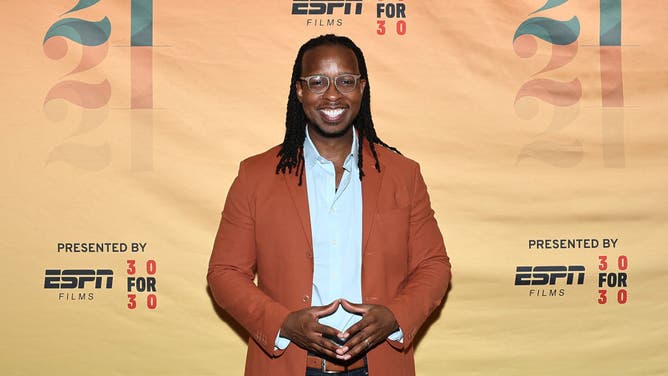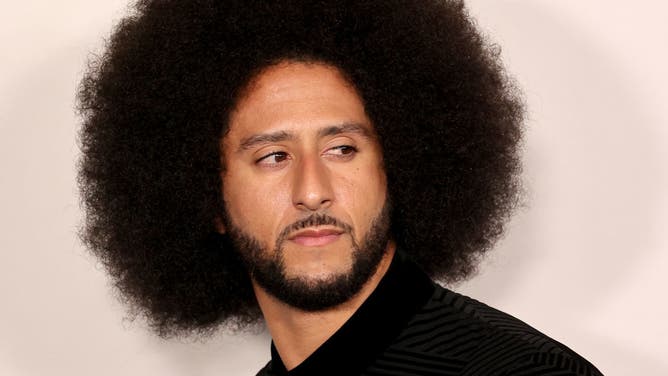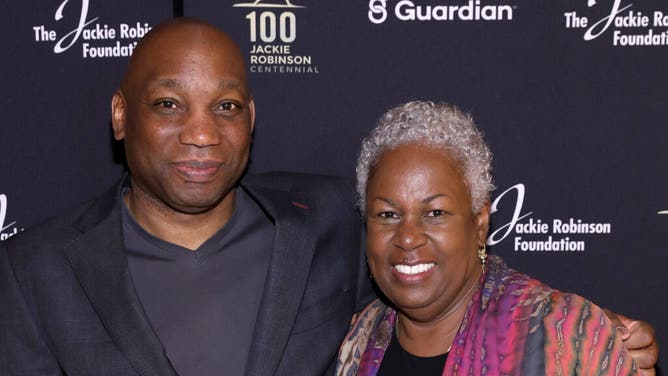ESPN, Ibram X. Kendi Documentary Claims 'Athletes Are Literally The New Slaves,' Sports Contracts Are The 'New Slave Chains'
Earlier this week, OutKick reported that ESPN quietly produced a series -- called "Skin in the Game" -- with noted race-hustler Ibram X. Kendi. We say quietly because they did not promote it as much as they usually do, especially when it comes to their products that baselessly cry racism.
From that story:
I had heard nothing about this ESPN+ series, titled "Skin in the Game." Apparently, it premiered Sept. 20, nearly two weeks ago. All five episodes are available on ESPN's streaming platform.
According to the ESPN press release, "The series delves into and challenges racism in the sports world, and will reveal how pervasive racism is in sports, while challenging the thoughts and systems of various governing bodies."
You can read that entire piece if you're interested in things like Ibram Kendi's "credentials" and why I believe ESPN tried to keep the series mostly under wraps.
One quick note on Kendi, though, before I continue. There are conflicting reports on whether his birth name was Ibram Henry Rogers or simply Henry Rogers. Either way, he changed his name to Ibram Xolani Rogers and then married an actual doctor whose last name was Kendi and took her name.
Feel free to do with that information what you will.

ESPN partners with Ibram X. Kendi (a.k.a. Ibram Henry Rogers, a.k.a. Henry Rogers) to produce a documentary titled "Skin in the Game" (a.k.a. "Sports is Racist). (Photo by Arturo Holmes/Getty Images for MVAAFF)
Because I care deeply about the OutKick audience, I watched the show. I know you don't want to do that -- and, frankly, I didn't either -- but at least I got paid to do it. Though, to be fair, not nearly enough.
Without further ado, some of the "highlights" from the first episode of ESPN and Ibram Kendi's "Everything in Sports is Racist" special (I assume that was the original title but they figured it might not do as well and changed it to "Skin in the Game").
"Highlights" from ESPN, Ibram Kendi's (a.k.a. Henry Rogers) first episode of "Skin in the Game"
Episode 1 title: "Power to the Players"
The show opens with Ibram Kendi sitting on a chair wearing a shirt that reads "The 1619 Project." That, of course, refers to the New York Times project that "aims to reframe history." Essentially, the idea is that America can never atone for slavery, that slavery was a core tenet in the creation of the nation and thus for its entire existence, and in perpetuity, is an inherently racist land.
And we're off to a flying start!
The first episode's title, "Power to the Players," refers to players using sports to fight for "social justice." Side note: what exactly is "social justice?" It's a great term. But, it has no real meaning. No one who claims to "fight for it" can actually define it. It's just like defining "woman," I suppose.
Three minutes in, we get the first Colin Kaepernick reference. I'm shocked it took that long, quite honestly.

No surpise that ESPN, Ibram X. Kendi (a.k.a. Ibram Henry Rogers, a.k.a. Henry Rogers) invokes Colin Kaepernick in the first episode of "Skin in the Game." (Photo by Kevin Winter/WireImage,)
Five minutes in and I've already lost count of the platitudes. So many phrases that sound profound, but offer zero substance. Things like "use their platform," "fight for change," "speak up," "athletic activism," "social injustice," "systemic racism," but still not one actual piece of evidence of what "change" or "fight" we're even talking about.
Next, they do actually dive into a specific situation. Kylin Hill, the former Mississippi State running back, discusses his role in getting the Confederate flag removed from the Mississippi state capitol.
An admirable cause, to be sure, but it's difficult to reconcile the idea that a flag is the biggest problem facing black Americans in Mississippi. If it is, then great! That means there aren't any more pressing issues. That's a good sign, not an ominous one.
If you thought the first half was racially-charged, just wait until you get to part two...
Next, Kendi welcomes "acclaimed journalist and author" Howard Bryant. He did not mention Bryant's past history of violence. That's interesting since the show used a LeBron James clip in an earlier vignette asking people to "end the violence." Oh, the irony.
Bryant drops this gem: "You pay a price for being black , there is no question about it."
That's an interesting comment, given the source. Remember that Bryant was arrested for allegedly choking his wife in public and then assaulting the police officer who arrived on the scene to protect his wife.
Bryant initially claimed that his arrest was racially-motivated (because of course he did) before later apologizing for that claim. He served no jail time and accepted probation to avoid any criminal charges.
Yet, People like Kendi invite him on shows to talk about racism. They call him an "acclaimed journalist." Sure seems that Bryant didn't pay a price for his actual crimes, let alone the one he claims without evidence.

Howard Bryant and Sharon Robinson (Photo by Bennett Raglin/Getty Images for Jackie Robinson Foundation)
They, along with Olympian Gwendolyn Berry, continue the discussion on athlete activism. As with the majority of the episode, they consistently reference acts from athletes in the 1960s, who actually did stand up against racist policy in America.
No one is arguing that black citizens in the United States in the early and mid-1900s faced racism that was backed by policy. The question is: what policies are in place NOW? What are these "changes" that athletes are "fighting for"?
Other than the argument about police brutality, which is not statistically-backed and is mainly narrative-driven, no one ever answers that critical question. ESPN, Ibram Kendi and his guests on "Skin in the Game" certainly don't, either.
Gwendolyn Berry makes outrageous comparison with Howard Bryant, Ibram X. Kendi (a.k.a Ibram Henry Rogers, a.k.a Henry Rogers) nodding in approval
But then comes the biggest bombshell of the entire episode and is delivered by Berry. Berry gained attention when she raised her fist during the American National Anthem after winning gold at the 2019 PanAmerican games.
She said at the time that she did it to "represent those who died to this systemic racism." She did not give examples of people dying from "systemic racism."

Gwendolyn Berry claims that professional athletes are "literally the new slaves." (Photo by Steph Chambers/Getty Images)
In the conversation with Kendi and Bryant, Berry claimed that athletic contracts are "the new slave chains."
I'm not a historian, but I don't believe slave chains came with multi-million dollar deals, fame and public status. I also don't believe that slaves had a choice on whether or not to accept those chains, whereas athletes don't HAVE to sign multi-million dollar deals.
I could be wrong. Someone can correct me if I am mistaken.
"Athletes are literally the new slaves," she continues. "Because we need this. Our family, our friends depend on this contract to eat."
Berry clearly doesn't understand what the word "literally" literally means.
And, while she makes these absurd comparisons, Bryant happily nods along and Kendi punctuates her point with a sigh and simple says, "Yep."
Professional athletes are akin to slaves, according to Ibram Kendi and ESPN
OK, a lot to digest there. Excuse the pun.
First, athletes are not required to sign contracts or play sports at all. That's how America works. They are free to choose other lines of work that don't require signing contracts.
Second, almost all Americans feed their families (though, probably not their friends) on normal jobs. This option is readily available. However, most normal jobs don't come with six-seven-or-eight-figure signing bonuses. I suspect that professional athletes choose this profession based on income potential.
Again, the key word being "choose."
Third, she complains that if athletes break the contract, they lose the money. Yes, that is how contracts work. All contracts. Even the ones non-black people sign.
Speaking of which, non-black athletes also sign contracts to play professional sports. So, even if her point were true -- which it isn't -- how are contracts racist?

Olympian Gwendolyn Berry claims that sports contracts are akin to "slave chains" while talking to Ibram X. Kendi (a.k.a. Ibram Henry Rogers, a.k.a. Henry Rogers) on the ESPN series "Skin in the Game"
This is the problem when people attempt to re-write history. The 1619 Project seeks to make everything about slavery. Thus, people who buy into this narrative see it everywhere. There is no comparison between slavery and professional athletes. Full-stop.
But, "activists" need something to fight against. If that something doesn't exist, they create it.
Later, Berry goes on to say that athletes have "so much political power it's ridiculous."
Well, that sure flys in the face of her slavery point. Again, I'm not a historian, but I don't think slaves sat around talking about their "political power."
There you have it. One episode in and we've checked all the major boxes on racism.
Not sure what the other four episodes have in store for us, but be sure to check back for my next review of "Skin in the Game" (a.k.a "Sports and Everything Else in America is Racist) presented by ESPN and featuring Ibram X. Kendi (a.k.a Ibram Henry Rogers, a.k.a Henry Rogers).